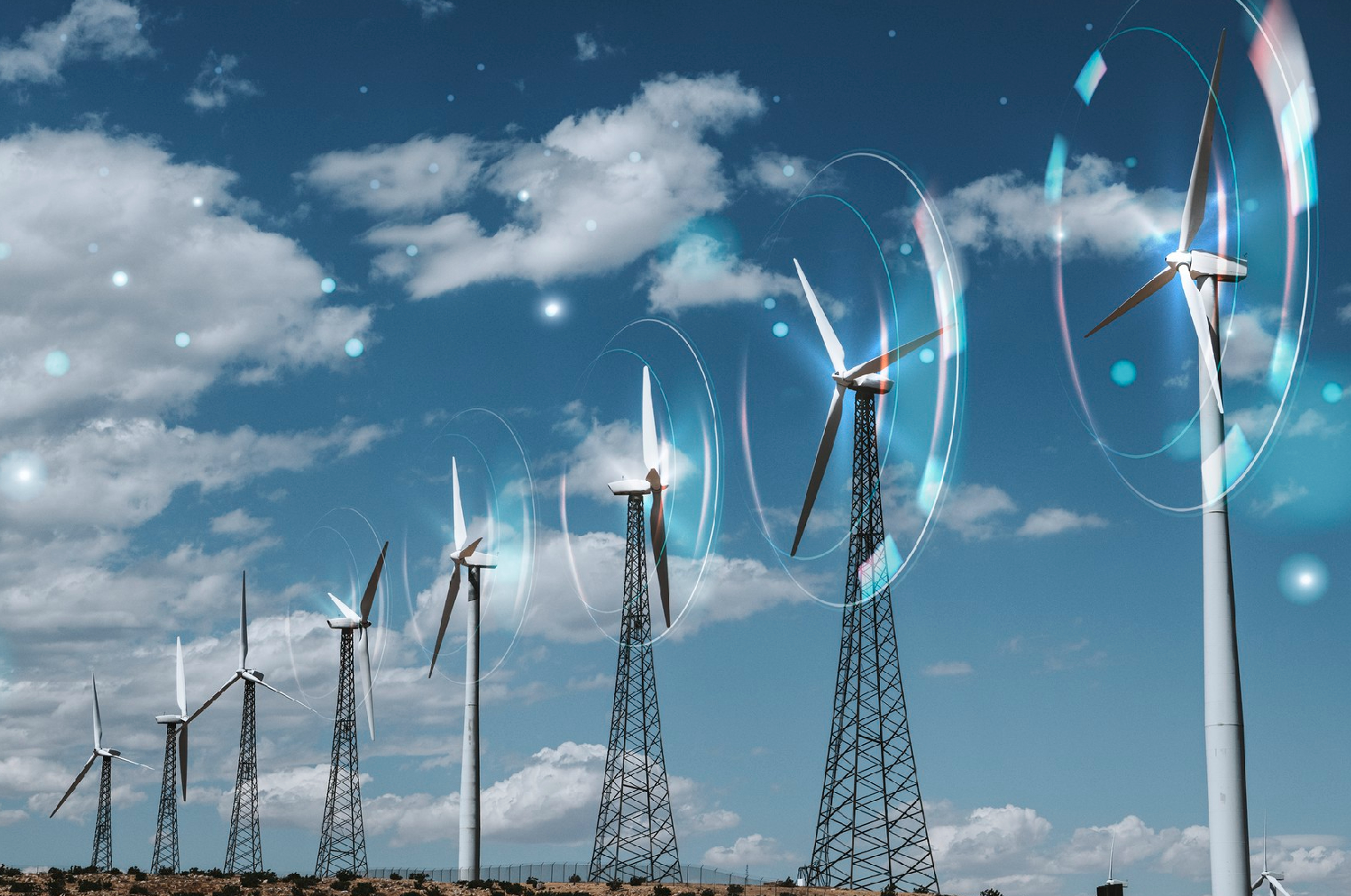Machine Learning and AI for revolution of Tech Companies are changing and streamlining businesses.
The integration of blockchain in energy and utilities can bring digital transformation and revolution in the industry. It can lead the industry towards a more efficient, secure, and sustainable energy ecosystem.
The global blockchain in energy and utilities market is projected to reach $1,564.0 million by 2026. This exponential growth underscores the increasing recognition of blockchain’s potential to revolutionize the energy sector.
From streamlining operations to enhancing transparency and fostering sustainability, blockchain technology offers many benefits that reshape how energy is produced, distributed, and consumed.
Let’s Understand Blockchain Technology
FYI, blockchain is a distributed, immutable ledger that records transactions in a secure and transparent manner. Unlike traditional databases, blockchain is decentralized, meaning that data is stored across a network of computers rather than in a single location. This decentralization enhances security and reduces the risk of data manipulation or single points of failure.
Each transaction on a blockchain is grouped into a “block,” which is then linked to the previous block in a chronological chain. This creates a tamper-proof record of all transactions, ensuring data integrity and building trust among participants. The use of cryptography further enhances security, making it virtually impossible for unauthorized parties to alter the blockchain.
Read more: Cloud Enablement in Energy and Utilities
Optimize Your Operations
Explore ViitorCloud’s Blockchain in Energy and Utilities Sector solutions to boost efficiency and sustainability.
Benefits of Blockchain in Energy and Utilities
Blockchain in energy and utilities offers a wide array of advantages that address some of the most pressing challenges facing the sector.
Here are some key benefits:
Transparency and Trust
Blockchain provides an immutable record of all transactions, ensuring transparency and building trust among stakeholders. Every participant in the network has access to the same information, which can be independently verified. This transparency reduces the risk of fraud and errors, fostering stronger relationships between utility providers and consumers.
Efficiency
By automating processes and eliminating intermediaries, blockchain streamlines operations and improves efficiency. Smart contracts, self-executing agreements written into the blockchain code, can automate billing, metering, and other services, reducing manual errors and speeding up transactions.
Better Demand Response Management
Blockchain technology aids in effective demand response management by helping to balance supply and demand in real-time. By using blockchain for digital utilities, energy distribution can be optimized, leading to cost savings and a more reliable power supply. Effective demand management is crucial for modern utility providers.
Reduced Costs
Blockchain technology helps cut down operational costs by automating processes, reducing the need for intermediaries, and optimizing energy distribution. Lower operational costs can eventually translate into reduced utility bills for consumers.
Security
Blockchain employs advanced cryptographic techniques to secure data and prevent data breaches. The decentralized nature of blockchain also makes it more resistant to cyberattacks, ensuring the security of sensitive information related to energy usage and billing.
Support for Renewable Energy
Blockchain facilitates the integration of renewable energy sources into the grid by enabling better tracking and management of renewable energy credits (RECs). This encourages the use of clean energy and promotes environmental sustainability.
Decentralized Energy Systems
Blockchain promotes the development of decentralized energy systems, allowing for more localized and efficient energy distribution. Peer-to-peer energy trading, enabled by blockchain, allows consumers to buy and sell excess renewable energy directly to each other, fostering a more resilient and sustainable energy supply.
Smart Contracts for Automated Operations
Smart contracts revolutionize utility operations by automating billing, metering, and other services. These self-executing contracts with predefined rules modernize agreements in the utilities sector, ensuring faster and more efficient service delivery without bureaucratic delays. They automate complex transactions and operational processes, including the real-time balancing of supply and demand.
Also Check: How Blockchain for Logistics Enhances Traceability and Efficiency
Transform Your Future
Discover how Blockchain in Energy and Utilities Sector drives sustainable innovation for energy management.
Use Cases of Blockchain in Energy and Utilities
The applications of blockchain in energy and utilities are diverse and far-reaching.
Here are some prominent use cases:
1. Peer-to-Peer Energy Trading
Blockchain enables consumers to buy and sell excess renewable energy directly to each other, bypassing traditional energy distribution models. This empowers consumers to become active participants in the energy market and promotes the adoption of renewable energy sources. SunContract, for example, is a P2P energy trading platform that uses blockchain technology to enable the buying and selling of renewable energy.
2. Smart Contracts for Automated Operations
Smart contracts automate billing, metering, and other services, reducing manual errors and increasing operational efficiency. They ensure transparent and tamper-proof execution of agreements, fostering trust between parties. Advanced automated billing systems, powered by smart contracts and data from smart meters, enable energy companies to offer more efficient and secure services to consumers.
3. Renewable Energy Tracking
Blockchain provides a transparent and immutable record of renewable energy generation and consumption, promoting transparency and accountability in the sustainable energy sector. This helps to track renewable energy usage effectively, guaranteeing that the energy consumed is green and sustainable, boosting confidence in using renewable resources, and promoting environmental responsibility.
4. Grid Management
Blockchain in energy and utilities facilitates smarter grid management by balancing energy supply and demand efficiently. This leads to a more reliable and consistent energy supply with fewer outages.
5. Electric Vehicle (EV) Charging
Blockchain can streamline the process of EV charging by enabling automated payments, managing charging station usage, and facilitating the integration of EVs into the grid.
6. Support for Microgrids
Blockchain supports the development of microgrids, which are localized energy grids that offer resilience and efficiency. This provides access to a more stable energy supply, especially in remote or underserved areas.
7. Water Consumption Tracking
Blockchain technology makes it possible to track and certify water consumption, defining the related payments based on the actual volume consumed. Through the installation of smart meters for monitoring consumption and the creation of an infrastructure for tracking and associating the corresponding economic transactions, utilities and municipalities could have accurate and certified readings of the consumption of their water reservoir.
Read: Reduce Carbon Footprint with AI and Automation in Energy & Utilities Industry
Leverage Smart Technology
Harness the power of Blockchain in Energy and Utilities Sector to achieve cost-effective and eco-friendly operations.
How Blockchain Increases Transparency
Blockchain’s inherent design promotes transparency by providing a clear and auditable record of energy transactions. In traditional energy systems, monitoring the flow of electricity from renewable sources is complex, involving multiple intermediaries and paper-based processes, which can lead to delays, inaccuracies, and opportunities for fraud.
Real-Time Data and Monitoring
Blockchain offers real-time data on energy production and consumption, which helps optimize energy distribution and reduce waste. Smart contracts on a blockchain can automate the process of energy trading, ensuring that transactions are executed fairly and efficiently.
Secure and Auditable Records
Blockchain provides a digital, tamper-proof ledger that records every transaction, from the moment energy is generated to the point it is consumed. This provides a clear, auditable trail that enhances transparency and builds trust among stakeholders.
Verification of Renewable Energy Certificates (RECs)
Blockchain can play a vital role in verifying the authenticity of renewable energy certificates (RECs), which are used to track the environmental attributes of renewable energy generation. By using blockchain to record and track RECs, it is possible to ensure their authenticity and prevent double-counting, enhancing the credibility of renewable energy markets and increasing consumer confidence.
Stakeholder Privacy
Blockchain technology in the energy sector offers a unique combination of transparency and privacy. It employs advanced cryptographic techniques to protect the privacy of individual users, ensuring that while the transaction data is visible, the identities of the parties involved are not disclosed without permission.
Blockchain and Sustainability
Blockchain contributes to long-term sustainability by promoting efficiency, and decentralization. The shift towards renewable energy is crucial for mitigating climate change, and blockchain plays a vital role in accelerating this transition.
Here’s how blockchain contributes to a more sustainable energy future:
- Renewable Energy Integration: Blockchain facilitates the tracking and trading of renewable energy credits (RECs), incentivizing the production and consumption of renewable energy.
- Energy Efficiency: Blockchain optimizes grid management and enhances energy efficiency, reducing overall energy consumption and costs.
- Decentralized Energy Systems: Blockchain supports the development of microgrids and decentralized energy systems, which are more resilient and environmentally friendly than traditional centralized systems.
- Carbon Emission Reduction: By promoting the use of renewable energy and optimizing energy consumption, blockchain helps to reduce carbon emissions and mitigate climate change.
Accelerate Industry Innovation
Drive operational excellence with our Blockchain in Energy and Utilities Sector solutions tailored for your business needs.
ViitorCloud Is Your Partner in Blockchain Solutions
ViitorCloud offers blockchain solutions to the energy and utilities sector. Our services are designed to enhance operational efficiency, reduce costs, and drive sustainability. We provide customized blockchain development to address challenges faced by the energy sector. Our expert team collaborates with clients to develop innovative strategies that meet immediate needs and align with long-term business goals.
Conclusion
Blockchain in energy and utilities is poised to revolutionize the energy sector, offering enhanced transparency, increased efficiency, improved security, and support for sustainability. By integrating blockchain technology, energy and utility companies can unlock new opportunities, reduce costs, and create a more resilient and sustainable energy future. As the technology continues to evolve and mature, its impact on the energy sector will only continue to grow.
ViitorCloud can be your best partner for blockchain solutions. Contact our team now, and let’s discuss your challenges!









